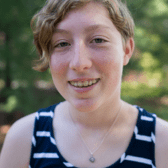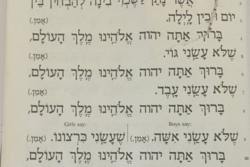Honey and Hanukah: How Food Justice has shaped my Judaism
We light candles in the quickly falling darkness and sing the Havdalah prayers. I don’t know all the words, but there are enough people who do so it doesn’t matter so much. A large group of people stands in a circle in a white tent with a dirt floor. As we sing, I look around and see people with different backgrounds and interests and lives than me, but despite these differences, I know that we are all connected by a shared religion and a shared passion for food justice.
This memory is from the Hazon Food Conference, which I attended as a seventh grader. Food and food justice had always been something that my family and I were passionate about, so I decided that for my Bat Mitzvah project, I would found a Community Supported Agriculture (CSA) program at my temple. CSA is a system in which customers pay a deposit in exchange for weekly bags of fresh vegetables, giving farmers more financial security, and the customer a steady supply of healthy, environmentally friendly, and in-season produce. My family had been a part of the Appleton Farms CSA for several years, and the open, sweet-smelling fields of the farm had always held a unique place in my heart. If I could share even a taste of that experience with others, my project would be a success.
My family quickly learned that starting a CSA took a lot of networking, and we exchanged many emails with local farmers, our rabbi, and members of our congregation. We also had to educate ourselves and others in order to convince people that what we were trying to do was important. My mom and I decided that attending the Hazon Food Conference would help us in this pursuit. So in December, we traveled to a Jewish retreat center in Connecticut for this weekend-long program about Judaism and food justice.
I arrived at the conference having no idea of what to expect. I didn’t know it yet, but over the course of the next two days I would sit in a yurt for a session about making temples environmentally friendly, wake up early without my mom for a sunrise hike around the neighboring farm, listen to a keynote panel speak about the Jewish dietary laws, learn how to make sourdough bread from one of the founders of Women of the Wall while discussing femininity and sexuality in Judaism, and attend the craziest (and only) Jewish New Year’s Eve party I’d ever experienced. I traveled home on Sunday afternoon with a jar of homemade sauerkraut, a handbook on how to start a CSA, and the newfound knowledge that my religion was not just something that had been handed down to me from my parents, but also something that I could make my own.
To me, food has always held an important place in my idea of Judaism. There are of course the obvious connections; almost every Jewish holiday has a food associated with it, so I grew up eating challah on Shabbat, apples and honey on Rosh Hashanah, and matzah on passover, but what Hazon helped me to discover is that on some deeper level, a meal can be a spiritually fulfilling experience as well. Sitting at a table with others and sharing food creates a sense of community like nothing else does. Visiting and thinking about the places where that food comes from can make you feel so connected to the earth that you cannot help but commit yourself to protecting it.
To me, these values are at the center of the Jewish faith; tradition, community, mindfulness, and responsibility. So it’s no wonder that we have so many laws about what we can and cannot eat. It’s no wonder that the cycle of our holidays is so connected to the cycle of the harvest. And it’s no wonder that the way we celebrate so many holidays is by gathering together for a meal.
I was raised with the values of food justice just as much as I was raised with the values of Judaism. As a child, I loved the mornings my dad and I would spend making scrambled eggs together, and as I became a young adult, I also learned to love the mornings when we would get up early and go to temple together. It wasn’t until my Bat Mitzvah project and the Hazon Food Conference, though, that I really started to notice how these two important threads in my life could be woven together.
This realization applies to more than just food. The older and more mature I grow, the more I have come to believe that none of the things I care about stand alone. They are all built on the same foundation, on the same values that I have been taught for as long as I can remember, and the fact is that those values are fundamentally Jewish. I want to make the world a better place, and that in and of itself is a Jewish value: Tikkun Olam. Taking part in the Hazon Food Conference helped me to realize that from food justice to feminism, Judaism can be a lens through which I view all of the pieces that make up who I am.
This piece was written as part of JWA’s Rising Voices Fellowship.








Gorgeous piece, Molly! xo REM